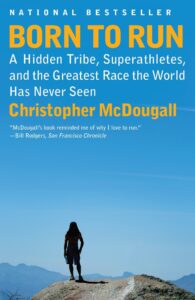This is the third installment in my ongoing project to compile a list of five books every negotiator and mediator should read. As stated in my previous blogs, the aim is not to focus on titles directly related to negotiation or mediation, like Getting to Yes by Roger Fisher and William Ury or The Mediation Process by Christopher Moore. Instead, I am spotlighting works that, while seemingly unrelated to conflict resolution, offer valuable insights or inspiration for the field. This is, of course, a deeply personal selection. In earlier posts, I included:
The Man Who Planted Trees by Jean Giono
The Peacemaker’s Code by Deepak Malhotra
Today, I am adding Born to Run by Christopher McDougall to the list.
The Wisdom of Running
 Christopher McDougall’s Born to Run was a global sensation upon its release, captivating readers far beyond the running community. While some books make you want to travel and others leave you craving a good glass of red wine, Born to Run literally made me want to stop reading and go for a run. The book combines memoir, investigative journalism, and adventure storytelling, unraveling the mysteries of ultra-distance running and the legendary Tarahumara tribe of Mexico, known for their unparalleled endurance. McDougall’s journey begins with a simple question—why does running hurt?—and ends with profound revelations about human potential, the art of movement, and the joy of community. There are many great passages, such as:
Christopher McDougall’s Born to Run was a global sensation upon its release, captivating readers far beyond the running community. While some books make you want to travel and others leave you craving a good glass of red wine, Born to Run literally made me want to stop reading and go for a run. The book combines memoir, investigative journalism, and adventure storytelling, unraveling the mysteries of ultra-distance running and the legendary Tarahumara tribe of Mexico, known for their unparalleled endurance. McDougall’s journey begins with a simple question—why does running hurt?—and ends with profound revelations about human potential, the art of movement, and the joy of community. There are many great passages, such as:
“Every morning in Africa, a gazelle wakes up. It knows it must outrun the fastest lion or it will be killed. Every morning in Africa, a lion wakes up. It knows it must run faster than the slowest gazelle, or it will starve. It does not matter whether you are the lion or a gazelle—when the sun comes up, you had better be running.”
A Running Mediator’s Mindset
It is no coincidence I am writing about running. Many mediators and negotiators are avid runners. Take, for example, Aled Davies or Sabine Walsh, who have spent a lot of time discussing running and its usefulness for the mediation mindset. We share race experiences, thoughts we have while running, and, if we are lucky enough to meet in person—which has unfortunately been rare in recent times—we go for a run together.
Personally, running has been a long-time passion. Lately, however, life’s demands—too many mediations and the raising of two small children—have kept me off the track. Still, I have committed to an 18-kilometer run this spring with my colleagues at the Centre for ADR at Charles University’s School of Law. It is a fantastic goal, and honestly, why wait for New Year’s resolutions?
Negotiation as an Endurance Sport
There is a deeper connection between running and mediation. Both require endurance, patience, and a willingness to push through discomfort. Mediators and negotiators, much like long-distance runners, need to pace themselves, maintain focus, and navigate complex terrain without giving up. Running teaches resilience—a quality essential in resolving conflicts.
Furthermore, for me, running has been a source of clarity and creativity. Some of my best ideas emerge on the trail, and many seemingly unsolvable problems have untangled themselves during a long run. As Christopher McDougall aptly stated,
“If you do not have answers to your problems after a four-hour run, you are not getting them.”
Needless to say, I do not bill clients for the time I spend running.
________________________
To make sure you do not miss out on regular updates from the Kluwer Mediation Blog, please subscribe here.



